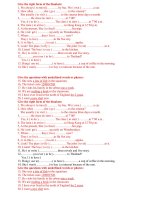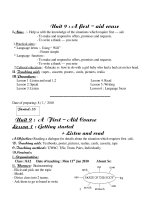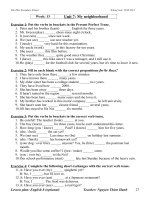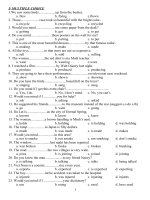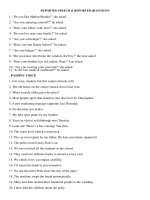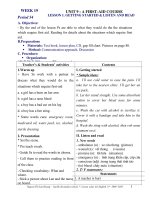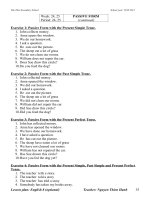bai tap Anh 8 -ki II
Bạn đang xem bản rút gọn của tài liệu. Xem và tải ngay bản đầy đủ của tài liệu tại đây (278.95 KB, 13 trang )
Gi¸o ¸n TiÕng Anh 8 GV: Ngun ThÞ
Minh
Ngµy d¹y:
Unit 1: REPORTED SPEECH
I-The aims and the requests:
-help Ss understand Commands, requests and advice in Reported Speech.
-By the end of the leson, ss will be able to do exercises well.
II-Grammar:
a.Commands, requests in Reported Speech: têng tht c©u yªu cÇu hc ®Ị nghÞ
*C©u têng tht (hay cßn gäi lµ c©u nãi gi¸n tiÕp) lµ c¸ch nãi mµ ngêi ta dïng ®Ĩ
tht l¹i hay kĨ l¹i cho ai nghe nh÷ng g× mµ ngêi kh¸c ®· hc ®ang nãi. Khi ®ỉi tõ
c©u trùc tiÕp sang c©u gi¸n tiÕp cần thay đổi đại từ nhân xưng, t©n ng÷ (personal
pronouns) cho thích hợp.
*Kh¼ng ®Þnh:
Trùc tiÕp: “Please, V + ……., + (Tªn)” , S + said / told.
Gi¸n tiÕp : S + told + O(tªn) + to + V………
VD: please wait for me, Mary . Tom said“ ”
=>Tom told Mary to wait for him.
*Phđ ®Þnh:
Trùc tiÕp: “Please, Don’t + V + ……., + (Tªn)” , S + said / told.
Gi¸n tiÕp : S + told + O(tªn) + not + to + V………
VD: “Don’t talk in class!” teacher said.
=> Teacher told the students not to talk in class.
b. Advice in Reported Speech: têng tht lêi khuyªn
DIRECT SPEECH REPORTED SPEECH
Miss Wilson said Tim should use this book.
Miss Wilson said Tim should get up earlier.
Miss Wilson said you should use that book.
Miss Wilson said you should get up earlier
*Cã thĨ tỉng hỵp thµnh b¶ng sau :
COMMANDS, REQUESTS AND ADVICE IN REPORTED SPEECH
Imperatives Direct speech Indirect speech
Affirmative
Imperative
V
1
+ ……
Mike said to Henry, “Come in,
please.”
S+ told / asked B + to + V
1
+ ……
Mike told Mary to come in.
Negative
Imperative
Don’t + V
1
+ ……
"Don't play on the grass, boys," she
said.
S+ told / asked B + not + to + V
1
+ …
She askes the boys not to play on the grass.
Requests
“Can/could/ may /might you ?”
“Could you close this door?”, said Nam to
me.
S+ told / asked B + to V
1
Nam asked / requested me to close that door.
Advice
“ You should / ought to + V1….”
He said to his son,” You should do your
S+ told + B +(that) S+ shough/ ought + to V
1
He told his son he should do his homework that
1
Giáo án Tiếng Anh 8 GV: Nguyễn Thị
Minh
homework tonight. night.
Direct speech Reported speech
This / These / Here
That / Those / There
Now/ Today / Tonight
Then / That day / That night
Tomorrow
Yesterday
Next week / year
Last week / year
The next/ following day
The day before
The following week/ year
The previous week / year
III-Practice:
-Làm các bài tập trong sách phô tô.
Ngày dạy:
Unit 2: The simple present perfect tense
I-The aims and the requests:
-help Ss understand The simple present perfect tense.
-By the end of the leson, ss will be able to do exercises well.
II-Grammar:
1-công thức:
(+) S + have/ has + V-pII
(-) S + have / has + not + V-pII
(?) Have/ Has + S + V-pII ?
-Yes, S + have/ has.
-No, S + have/ hasn t.
Notes: Have: they, we, you, 2TR
Has : I, she, he, it, 1TR
2-Cách dùng:
-Diễn tả 1 sự việc vừa mới xảy ra.
Ex: she has just arrived at the airport.
They have begun a new English class recently.
-Diễn tả sự việc xảy ra nhng không nhớ rõ thời gian.
Ex: I have already seen that play.
-Have you ever been to New York?
-He has not repaired his car yet?
-Diễn tả 1 sự việc đã xảy ra trong quá khứ và còn liên quan đến hiện tại.
2
Gi¸o ¸n TiÕng Anh 8 GV: Ngun ThÞ
Minh
Ex: I have lived in Lam Cot since 2004.
I have lived in Lam Cot for 4 years.
3-C¸c tõ ®i kÌm:
Just, since, for, recently, yet, never, ever, already, before, so far, it’s the first/ second
time , up to now, up to the present, till now(cho tíi b©y giê), all + TTSH + life.…
*VÞ trÝ cđa c¸c tõ:
Just, never, ever, already ®øng ngay sau have/ has.
Yet, before ®øng ci c©u.
*Notes: yet: chØ dïng trong c©u phđ ®Þnh vµ c©u hái.
For + kho¶ng thêi gian.
Since + mèc thêi gian ë qu¸ khø.
Never: mang nghÜa phđ ®Þnh.
III-Practice:
-Lµm c¸c bµi tËp trong s¸ch ph« t«.
Ngµy d¹y:
Unit 3: PHRASE OF PURPOSE and ajectives
I-The aims and the requests:
-help Ss understand phrase of purpose and ajectives
-By the end of the leson, ss will be able to do exercises well.
II-Grammar:
1-ADJECTIVE FOLLOWED BY AN INFINITIVE : It’s + adjective + to-V
- It’s dangerous to swim in that river. (Bơi ở con sông đó thật nguy hiểm.)
- It’s easy to learn English. ( Rất dễ học tiếng Anh. / Học tiếng Anh rất dễ.)
- It’s difficult to do that exercise. (Làm bài tập đó rất khó.)
Những Adjectives thường gặp trong cấu trúc này là:
easy, difficult, hard, dangerous, important, necessary, lovely, interesting, nice, great…
=> It’s + adj + to V… = To V…. + tobe + adj = V-ing + tobe + adj
2- ADJECTIVE FOLLOWED BY A NOUN CLAUSE:
Subject + Verb + adjective + noun clause
- They are delighted that you passed your exam. (Họ rất vui khi bạn thi đậu.)
- He was happy that you remembered his birthday. ( Ông ấy rất vui khi bạn nhớ sinh nhật của
ông ấy.)
3
Gi¸o ¸n TiÕng Anh 8 GV: Ngun ThÞ
Minh
- I’m sure that they will come. (Tôi chắc chắn họ sẽ đến.)
Những Adjectives thường gặp trong cấu trúc này là:
happy, delighted, sad, sure, certain, relieved, afraid, sorry…
3. PHRASE OF PURPOSE
Ta có thể dùng cấu trúc so as (not) to + Vo hoặc in order (not) to + Vo để diễn tả 1 mục đích.
Ví dụ:
- I study hard in order to pass the exam.
- I study hard so as to pass the exam
- She opened the umbrella in order to protect herself from rain.
- She opened the umbrella so as to protect herself from rain.
III-Practice:
-Lµm c¸c bµi tËp trong s¸ch ph« t«.
Ngµy d¹y:
Unit 4: passive voice
I-The aims and the requests:
-help Ss understand the passive voice.
-By the end of the leson, ss will be able to do exercises well.
II-Grammar:
1-c«ng thøc tỉng qu¸t:
S + V + O
S + be + pII + by+O
*C©u bÞ ®éng ë th× hiƯn t¹i thêng:
S + V-s,es + O
S + am/ is/ are+ pII + by+O
Ex: The workers make the pens.
The pens are made by workers.
*C©u bÞ ®éng ë th× qu¸ khø ®¬n:
S + V-ed + O
4
Giáo án Tiếng Anh 8 GV: Nguyễn Thị
Minh
S + was/ were+ pII + by+O
EX: I visited my grandparents last week.
My parents were visited by me last week.
*Câu bị động ở thì hiện tại hoàn thành:
S + have/ has + V-pII+ O
S + have/ has + been + pII + by+O
Ex:They have built this house since last week.
This house has been built since last week (by them)
*Câu bị động của các động từ khuyết thiếu:
S + modal + V + O
S + modal + be + pII + by+O
Ex:He can mend this bike.
This bike can be mended by him.
2-Cách chuyển từ câu chủ động sang câu bị động:
-Xác định chủ ngữ, động từ, tân ngữ của câu chủ động.
-Tân ngữ của câu chủ động chuyển thành chủ ngữ của câu bị động.
-Viết be ở thì của động từ chính trong câu chủ động.
-Viết động từ chính của câu bị động ở dạng quá khứ phân từ.
-Chủ ngữ của câu chủ động chuyển thành tân ngữ của câu bị động, viết sau chữ BY.
-Nếu chủ ngữ là đại từ nhân xng (they, he, she, we, you) hay đại từ bất định
(someone, everyone ) có thể bỏ ở câu bị động.
-Đối với động từ khuyết thiếu ở câu bị động, ta thêm BE vào giữa động từ khuyết
thiếu và động từ chính (ở dạng quá khứ phân từ)
III-Practice:
-Làm các bài tập trong sách phô tô.
Ngày dạy:
Unit 5: V-ing and V-ed participles and requests
I-The aims and the requests:
-help Ss understand V-ing and V-ed participles and requests .
-By the end of the leson, ss will be able to do exercises well.
II-Grammar:
5
Gi¸o ¸n TiÕng Anh 8 GV: Ngun ThÞ
Minh
1- HiƯn t¹i ph©n tõ vµ qu¸ khø ph©n tõ: V-ing and V-ed participles:
Có 2 loại Participle Phrases : Present Participle Phrases và Past Participle Phrases.
a. Present Participle Phrases: diễn tả ý chủ động (Active), hoặc “đang làm gì”.
- The boy standing over there is Jack.
- The boys playing in the garden are his sons.
b. Past Participle Phrases: diễn tả ý thụ động (Passive)
- The car made from recycled aluminum cans is 5 dollars.
- The doll dressed in blue is Mary’s.
2-c©u yªu cÇu vµ ®Ị nghÞ:
• Chúng ta có thể dùng 1 trong những cách sau đây để đưa ra 1 lời đề nghò hoặc yêu cầu.
Lưu ý động từ đứng sau mind phải ở dạng V-ing (Gerund)
C«ng thøc: Do you mind +V-ing
Would you mind
- Do you mind opening the window? (Phiền bạn mở dùm cửa sổ.)
- Would you mind opening the window? (Phiền bạn mở dùm cửa sổ.)
* Nếu đồng ý, ta có thể dùng 1 trong những cách sau đây:
- No, I don’t mind.
- No, of course not.
- Not at all.
- No problem.
* Nếu không thể làm theo yêu cầu, ta có thể dùng 1 trong những cách sau đây:
- I’m sorry, I can’t.
- I’m afraid, I can’t.
- I’m sorry, that is not possible.
• Nếu muốn xin phép cho mình làm chuyện gì, ta có thể dùng 1 trong những cách sau đây:
C«ng thøc: Do you mind if I + V-ht ………
Would you mind if I + V-qk …
- Do you mind if I open the window? (Tôi mở cửa sổ có phiền cho bạn không?)
- Would you mind if I opened the window? (Tôi mở cửa sổ có phiền cho bạn không?)
* Nếu đồng ý, ta có thể dùng 1 trong những cách sau đây:
- No, I don’t mind.
- No, of course not.
- Not at all.
- No problem.
- Please do.
6
Gi¸o ¸n TiÕng Anh 8 GV: Ngun ThÞ
Minh
- Please go ahead.
* Nếu không đồng ý, ta có thể dùng 1 trong những cách sau đây:
- I’d prefer you didn’t.
- I’d rather you didn’t.
III-Practice:
-Lµm c¸c bµi tËp trong s¸ch ph« t«.
Ngµy d¹y:
Unit 6: the past continuous tense
I-The aims and the requests:
-help Ss understand the past continuous tense.
-By the end of the leson, ss will be able to do exercises well.
II-Grammar:
1-Th× qu¸ khø tiÕp diƠn: (past continuous)
1-C«ng thøc:
(+)S + was/ were + V-ing .…………
(-) S + was/ were + not + V-ing……
(?) Was/ Were + S + V-ing .?………
-Yes, S + was/ were.
-No, S + was/ were + not.
2-C¸ch dïng:
-DiƠn t¶ 1 hµnh ®éng ®ang diƠn ra t¹i 1 thêi ®iĨm x¸c ®Þnh trong qu¸ khø.
Ex: I was watching TV at 8 o’clock last night.
-DiƠn t¶ 1 hµnh ®éng ®ang x¶y ra th× hµnh ®éng kh¸c c¾t ngang.
Ex: When my mother came, I was watching TV.
(hµnh ®éng nµo x¶y ra tríc: chia ë QKTD, hµnh ®éng x¶y ra sau: chia ë QK§ vµ ®i
kÌm when)
-DiƠn t¶ 2 hµnh ®éng cïng x¶y ra t¹i 1 thêi ®iĨm x¸c ®Þnh trong qu¸ khø.
Ex:While I was watching TV, my father was reading a newspaper.
3-C¸c tõ ®i kÌm:
At 8 o’clock last night, at this time last week/ month/ year, when + QKT, while.
*Mét sè ®éng tõ kh«ng chia ë th× tiÕp diƠn:
Hear, know, understand, have, love, like, want, prefer, need, wish………
2-Th× hiƯn t¹i tiÕp diƠn víi always
Mang ý nghÜa than phiỊn vỊ ®iỊu g×:
You are always getting up late in winter.
Mai is always getting up late in winter.
7
Giáo án Tiếng Anh 8 GV: Nguyễn Thị
Minh
- Asks Ss if they often talk in class in order to give the complain
Encourage Ss to give the complain about their friends:
S
A
: You are always talking in class.
Minh is always talking in class.
S + am/ is / are + always + V
ing
III-Practice:
-Làm các bài tập trong sách phô tô.
Ngày dạy:
Unit 7: REPORTED SPEECH
I-The aims and the requests:
-help Ss understand REPORTED SPEECH.
-By the end of the leson, ss will be able to do exercises well.
II-Grammar:
REPORTED SPEECH
* Direct reported speech: (Câu trực tiếp- Câu gián tiếp)
+Câu trực tiếp: là câu nói đợc thuật lại đúng nguyên văn lời của ngời nói.
VD:Tom said, I like reading books.
Note: câu trực tiếp đợc viết trong ngoặc kép, và ngăn cách với mệnh đề tờng thuật bởi dấu
phẩy.
+Câu gián tiếp: là lời nói đợc thuật lại với ý và từ của ngời thuật nhng vẫn giữ nguyên ý.
VD: Tom said he liked reading books.
Note: Câu gián tiếp không bị ngăn cách bởi dấu phẩy, dấu ngoặc kép và luôn tận cùng bằng
dấu chấm.
*Câu trực tiếp và câu gián tiếp bao giờ cũng gồm hai phần:
-Câu tờng thuật/ mệnh đề tờng thuật.
-Câu trực tiếp hay câu gián tiếp.
Tom said, I like reading books.
MĐ tờng thuật câu trực tiếp
Tom said he liked reading books.
MĐ tờng thuật câu gián tiếp
*Những thay đổi khi chuyển từ câu trực tiếp sang câu gián tiếp :
-Đổi ngôi, đổi thì, từ chỉ thời gian và nơi chốn theo quy tắc.
1-Đổi ngôi:
8
Giáo án Tiếng Anh 8 GV: Nguyễn Thị
Minh
-Ngôi thứ nhất: I, me, my, mine, myself, we, us, our, ours, ourselves đợc đổi theo ngôi của
chủ ngữ ở mệnh đề tờng thuật.
Tom said, I like reading books.
> Tom said he liked reading books.
-Ngôi thứ 2: you, yours, your, yourself, yourselves đợc đổi theo ngôi của tân ngữ của mệnh
đề tờng thuật.
He said to me, You can take my book.
> He said to me (that) I could take his book.
Ngôi thứ 2 đợc đổi thành ngôi thứ 3 nếu mệnh đề tờng thuật không có tân ngữ.
He said, You can take my book.
> He said she could take his book.
-Ngôi thứ ba: he, him, his, himself, they, them, their, theirs, themselves giữ nguyên
VD: Mai said, They cant finish their homework.
> Mai said they couldnt finish their homework.
2-Đổi thì:
Khi chuyển từ câu trực tiếp sang câu gián tiếp ta phải lùi 1 thì :
Trực tiếp Gián tiếp
+Hiện tại đơn
+Hiện tại tiếp diễn
+Quá khứ đơn
+Hiện tại hoàn thành
+Quá khứ tiếp diễn
+Hiện tại hoàn thành tiếp diễn.
+Tơng lai thờng: Will/ shall
+Tơng lai hoàn thành
+Qúa khứ hoàn thành
+Các câu điều kiện
>Quá khứ đơn
>Quá khứ tiếp diễn
>Quá khứ hoàn thành
>Quá khứ hoàn thành tiếp diễn
>Tơng lai trong quá khứ : Would/ should
>would/ could + have + V-pII
> không đổi
> không đổi
3-Đổi từ chỉ thời gian, nơi chốn:
Trực tiếp Gián tiếp
This
These
Here
Now
Ago
Today
That
Those
There
Then/ at one/ immediately.
Before
That day
9
Giáo án Tiếng Anh 8 GV: Nguyễn Thị
Minh
Tonight
Tomorrow
Yesterday
Last night/ week/ month/ year
Next week/ month/ year
That night
The next/ following day.
The day before/ the previous day
The night/ week/ month/ year before hoặc the
previous night
The following week/ month/ year.
*Các dạng câu trực tiếp chuyển sang câu gián tiếp:
1-Dạng câu trực tiếp là câu phát biểu:
*Cách chuyển:
-Lặp lại từ said/ say.
-Bỏ ngoặc kép, bỏ dấu phẩy thay bằng that.
-Thay đổi thì, từ chỉ thời gian và nơi chốn, ngôi cho phù hợp với nghĩa của câu (nếu có)
*Công thức:
Trực tiếp: S + said, Clause
>Gián tiếp: S + said + (that) Clause (lùi thì)
VD: Lan said: I am a student.
>Lan said (that) she was a student.
2-Dạng câu trực tiếp là câu cầu khiến, câu mệnh lệnh:
*Cách chuyển:
-Đổi động từ say >tell, said >told, sau đó thêm tân ngữ vào sau nó.
-Bỏ dấu phẩy, dấu ngoặc kép, dấu chấm than, từ please (nếu có).
-Đổi đại từ nhân xng, tính từ sở hữu, trạng từ chỉ thời gian, nơi chốn (nếu cần thiết)
*Công thức:
+Khẳng định: Trực tiếp: S + say/ said, V
>Gián tiếp: S + tell/ told + O + to + V .
VD: She said, Close the books, please!
>She told the students to close the books.
+Phủ định: Trực tiếp: S + say/ said, Don t + V
>Gián tiếp: S + tell/ told + O + not + to + V .
VD: She said, Dont sit down!
>She told me not to sit down
3-Dạng câu trực tiếp là câu hỏi đảo (Yes/ No- questions)
10
Giáo án Tiếng Anh 8 GV: Nguyễn Thị
Minh
*Cách chuyển:
-Đổi said >asked (hoặc wanted to know/ wondered) sau đó thêm tân ngữ (nếu cần thiết).
-Bỏ dấu ngoặc kép, dấu phẩy và dấu hỏi.
-Đặt If/ whether lên trớc chủ ngữ của câu gián tiếp +động từ lùi thì.
-Đổi ngôi, đổi từ chỉ thời gian và nơi chốn(nếu cần thiết).
*Công thức: Trực tiếp: Do/ Does/ Did + S + V-nd .?
>Gián tiếp: S + asked + O + if/ whether + S + V-lùi thì
VD: Do you go to school? he said.
>He asked me whether/ if I went to school.
+Dạng động từ khuyết thiếu:
Trực tiếp: Can/ shall/ will+ S + V-nd .?
>Gián tiếp: S + asked + O + if/ whether + S + could/ should/ would + V-nd
VD: Mary said to Nam, Can you speak English?
>Mary asked Nam if/ whether he could speak English.
4-Dạng câu trực tiếp là câu hỏi có từ để hỏi: (Wh-questions)
*Cách chuyển:
-Đổi said >asked (hoặc wanted to know/ wondered) sau đó thêm tân ngữ (nếu cần thiết).
-Bỏ dấu ngoặc kép, dấu phẩy và dấu hỏi.
-Đặt từ hỏi wh lên trớc chủ ngữ của câu gián tiếp +động từ lùi thì.
-Đổi ngôi, đổi từ chỉ thời gian và nơi chốn(nếu cần thiết).
*Công thức: Trực tiếp: Từ hỏi + do/ does/ did + S + V-nd .?
>Gián tiếp: S + asked + O + từ hỏi + S + V-lùi thì
VD: Where do you live? he said.
>He asked me where I lived.
+Dạng động từ khuyết thiếu:
Trực tiếp: Từ hỏi + can/ shall/ will+ S + V-nd .?
>Gián tiếp: S + asked + O + Từ hỏi + S + could/ should/ would + V-nd
VD: Mary said to Nam, How can you speak English?
>Mary asked Nam how he could speak English.
*Với TOBE:
VD1: Are you a student? She asked me.
>She asked me if I was a student.
VD2: Is she doing her homework? Mary asked him.
11
Gi¸o ¸n TiÕng Anh 8 GV: Ngun ThÞ
Minh
>Mary asked him if she was doing her homework.
VD3: “What are you doing?” Mai said to Hoa
>Mai asked Hoa what she was doing.
Note:NÕu c©u hái víi will/ shall diƠn t¶ yªu cÇu, lêi mêi, ®Ị nghÞ cã thĨ chun …
sang c©u gi¸n tiÕp d¹ng c©u hái hc c©u cÇu khiÕn.
VD: He said, Will you open the door?“ ”
>He asked me to open the door. (He asked me If I would open the door)
III-Practice:
-Lµm c¸c bµi tËp trong s¸ch ph« t«.
Ngµy d¹y:
Unit 8: COMPOUND WORDS WITH
noun V-ing
+ TO-INFINITIVE
I-The aims and the requests:
-help Ss understand COMPOUND WORDS WITH noun V-ing–
-By the end of the leson, ss will be able to do exercises well.
II-Grammar:
1. QUESTIONS WORDS BEFORE TO-INFINITIVES:
Wh-word + to-infinitive
Những động từ thường dùng trong cấu trúc này là: tell, show, point out, learn …
- He told me what to do.
- He showed us how to open the box.
- He pointed out where to get tickets.
2. VERB + TO-INFINITIVE
Những động từ thường dùng trong cấu trúc này là:
start, begin, decide, want, try, manage, would like, agree, …
- I want to buy a new shirt.
- He decided to go home.
- They started to run.
3. COMPOUND WORDS WITH noun – V-ing
Hãy nhận xét cách thành lập tónh từ kép trong các ví dụ sau:
- The people who love peace => The peace-loving people
12
Gi¸o ¸n TiÕng Anh 8 GV: Ngun ThÞ
Minh
- The story that breaks our heart => The heart-breaking story.
Hãy nhận xét cách thành lập danh từ kép trong các ví dụ sau:
- Stamp collecting
- Window shopping
III-Practice:
-Lµm c¸c bµi tËp trong s¸ch ph« t«.
13
